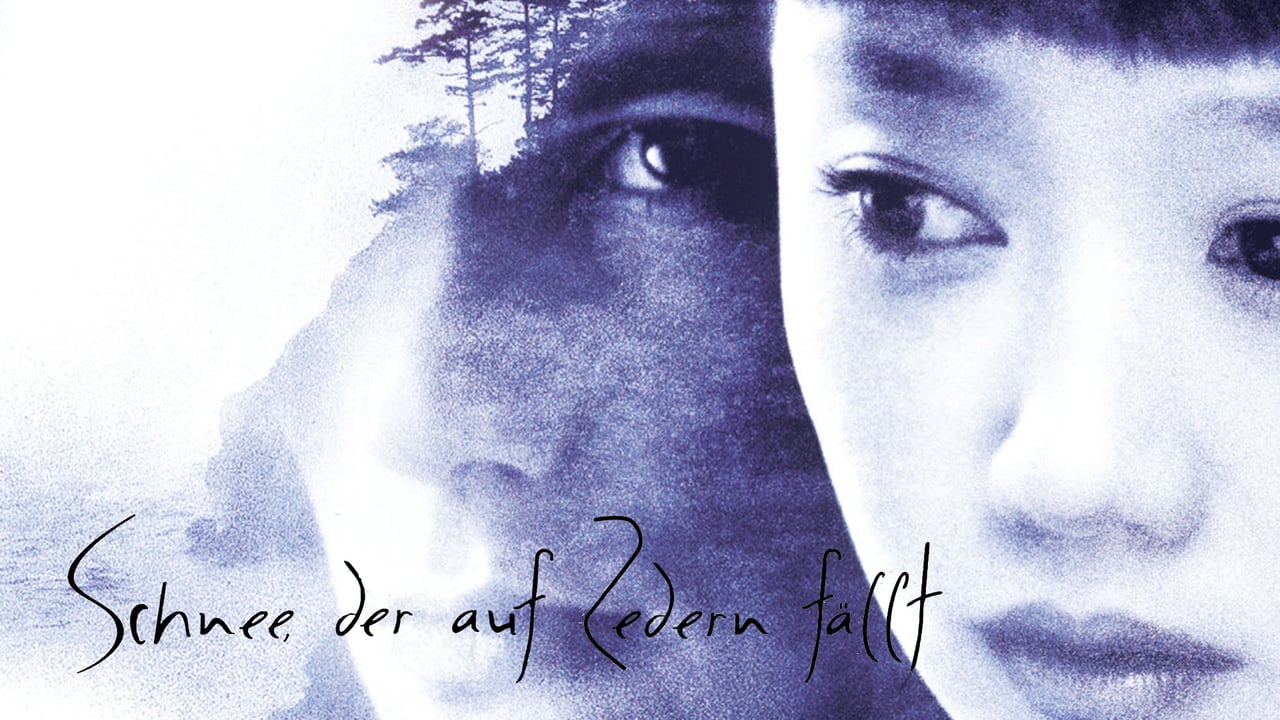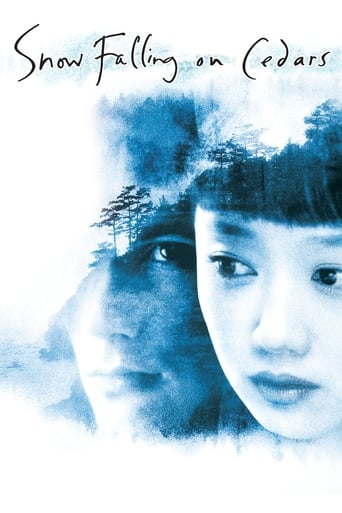



A Brilliant Conflict
At first rather annoying in its heavy emphasis on reenactments, this movie ultimately proves fascinating, simply because the complicated, highly dramatic tale it tells still almost defies belief.
View MoreThis is ultimately a movie about the very bad things that can happen when we don't address our unease, when we just try to brush it off, whether that's to fit in or to preserve our self-image.
View MoreGreat movie. Not sure what people expected but I found it highly entertaining.
View MoreIn "To Kill a Mockingbird", a man, Tom Robinson, is accused of rape, largely because he is African-American, and because he was kissed by a white woman in the rural 1930's South. In "Snow Falling on Cedars", a Japanese-American in the Northwest is accused of murder because a white fisherman is found dead in his fishing net not long after World War II. The setting is in the wake of racial animosity because of the internment of Japanese-Americans during World War II. The case is largely brought forth because of prejudicial attitudes prevalent at the time rather than strong evidence. (Ironically, German-Americans did not suffer the same fate as the Japanese during the same period.) The brilliance of the film, which I assume is more or less faithful to the book, is its handling of several separate but intertwined stories. At the forefront is the murder trial of Kazuo Miyamoto, a young Japanese-American in the 1950's who fought on the American side of World War II, played brilliantly understated by Rick Yune. He is accused of murdering Carl Heine, a fellow fisherman, who now has land previously owned by Japanese who were forced to give it up (as well as most of their possessions) when they were unjustly forced into interment camps on the West Coast.The other stories involve Hatsue Miyamoto (played wonderfully by Youki Kudoh) and Ishmael Chambers (Ethan Hawke in possibly his best performance since "Reality Bites") as star-crossed lovers before adulthood. We learn, largely through flash-backs, that the American white boy and Japanese girl met and fell in love on the eve of Japanese-American internment. Their story parallels the later court case, and the loss of their relationship is because of the racial divides imposed by the US Government, fearing that all Japanese-Americans were suspect because of their ancestry, rather than any evidence they were actually secretly in conspiracy with the Japanese Empire. The love between Hatsue and Ishmael is told through flash-backs. Hatsue is now the wife of the accused, and Ishmael has followed in the footsteps of his father and become a reporter and journalist. We learn that Ishmael still has strong feelings for the woman who once loved him when they were but children, but he is side-lined from their lives.Like "Mockingbird", "Cedars" is largely about the tragedy of prejudice and racism. One aspect of the story which emerges, possibly not consciously, is how the Japanese-Americans are largely similar to their white counterparts. They like much of the popular American music of the 1940's, they play games, they enjoy good food and wine. Of course, their interests in Buddhism are different, but I believe the point of the story is that the similarities between cultures are often overlooked in favor of our few differences. Although most of the focus is on the white community being wary of their Japanese neighbors, in a poignant scene, the young Hatsue is told by her good-intentioned mother that her daughter should not look at white boys, and should marry a Japanese boy. So prejudice cuts in both directions, often with tragic results. Some of the most heinous crimes in human history are perpetrated out of fear. And if someday, we could let go of our fears of "the other", maybe the world would be a better place.
View MoreWatching this film is like having someone holding onto my heart so tight it's strangled. The hate that lives in the hearts of some people is so dark and cold and mean it's devastating. Too many do not know how Japanese immigrants were treated in the United States not even a century ago. What's so shameful is the perpetrators were White Europeans who were immigrants themselves from Germany, Sweden, Holland, Great Briton. It's a disgrace on modern society during its growing stages to know how non-whites were treated with such disdain and disrespect. It makes me angry and deeply disheartened at the same time. It would not be so bad if we, as a society could say that was a dark time we have evolved from, but alas, it is still happening. there are So many people who feel terrible hate and disdain against people other than their own color, race, religion, gender, sexual orientation, etc., etc., we have not learned, we grow so slowly.
View MoreThis film is a travesty against it's source material - being one of the finer works of fiction from the 90s - and should be avoided by any and all who have read the novel. The wonderful cinematography aside, the film fails to deliver in nearly every aspect. Wooden acting; a script as stilted and predictable as a Louis L'Amour novel; and a lack of subtlety so apparent, it might as well be a PSA against racism all weigh heavily against this waste of film stock. Furthermore, and in collusion with the above statements, far too many liberties were taken with the novel to fairly call this a translation of the original. It merely preserves the strongest theme of novel - racism - and runs over the rest. Finally, the sex scenes present in the book are washed over so as to satisfy a PG13 rating, but these were absolutely pivotal to the understanding the characters and their motivations.
View MoreScott Hick's "Snow Falling on Cedars" is a lovely film really it is. Based on the book by David Guterson, "Snow Falling on Cedars" surrounds a murder trial taking place on a small fishing island off the coast of Washington State. Kazuo Miyamoto (Rick Yune) is on trial for the murder of a fisherman, Carl Heine (Eric Thal). But of course, the trial isn't simply a matter of murder, it's a matter of racial prejudice in a post-WWII era. Covering the story for the local newspaper is Ishmael Chambers (Ethan Hawke); who just happens to be in love with Miyamoto's wife, Hatsue (Youki Kudoh).The story is good. Rather "Casablanca"-esque. Maybe a little bit of "To Kill a Mockingbird", but it works. The screenplay, too, is well written with dialogue that fits the story and Hicks's point (he served as screenwriter in addition to directing).Acting wise, "Snow Falling on Cedars" is fine. Just fine. Nothing outrageously bad. Nothing outrageously good. (Although Max von Sydow gives a notable performance as Nels and Yune's performance is not without its merits) Ishmael Chambers is Hawke's standard role: brooding, compassionate, emotionally and physically wounded. But his performance is poor. The character deserved cold passion not just distant stares. This is a film, not a book. We have no way of knowing what is going on inside our protagonist's head. The casting of Kudoh as Hatsue might have been a mistake as well. Not that she isn't good (she's fine), but it is a notable part of the story that Hatsue and Kazuo though of Japanese heritage are *Americans*.No one can ignore the beautiful cinematography of "Snow Falling on Cedars". The images of the island in winter are breathtaking. In that aspect, "Snow Falling on Cedars" is almost a Western in that the landscape and weather are as much a part of the story as the characters we are faced with. And from that, comes the editing. What can be said about the editing? It's safe to say that "Snow Falling on Cedars" would never have been released had it been created in Hollywood's Studio Era. Rather, the editors would have had their heads chopped up and their bodies impaled on pikes as warnings to all editors to come: DO NOT MAKE EDITING OBVIOUS. IT DISTRACTS FROM THE STORY. In "Snow Falling on Cedars", there is no way that you *cannot* notice the editing. It's everywhere. All the time. In fact, it's practically omniscient. To put it gently, "Snow Falling on Cedars" is just one giant montage. To put it frankly, someone got a *little* too happy when it came to editing. And by a little too happy, I mean a LOT too happy. There is not a single five minute sequence without some sort of creative editing tweak or artistic camera angle. This is Hicks's attempt to out-gloss, out-imagine Orson Welles and "Citizen Kane." And it ruins the movie. The editing is just so pretentious and *there* that nothing else exists on screen."Snow Falling on Cedars" had potential. But it fails miserably. The cinematography and scenery may be stunning, but the editing ruins the film. No, I take that back. It doesn't ruin the film, it drops a nice big atomic bomb on it, so that all the audience gets is an f-ed up collage of gloss better suited for a midnight avant-garde screening than a full fledged cinema. A waste of my time. Avoid at all costs.
View More